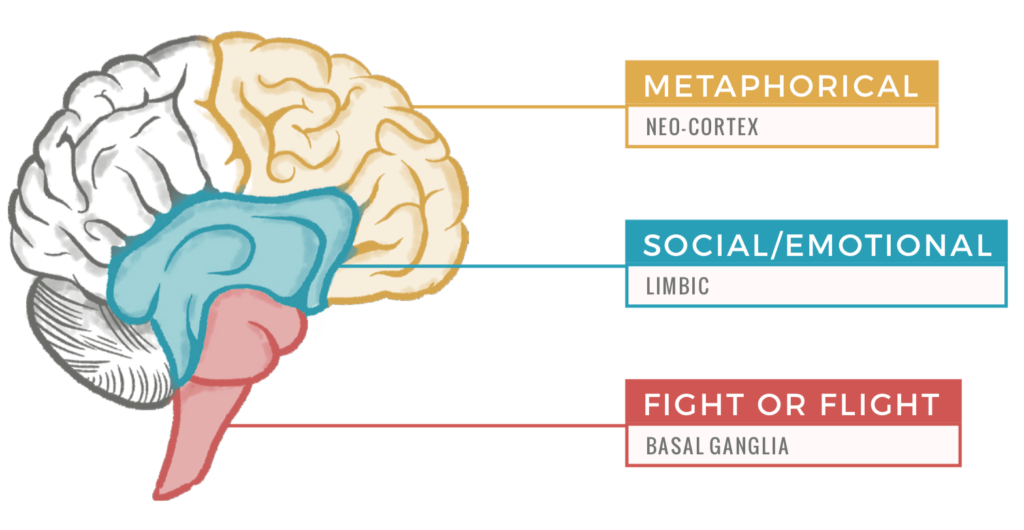Ancient wisdom and the received science says we have three brains.
But we don’t.
So says Lisa Feldman Barrett.
Or do we?
This is what we are talking about as we continue with Barrett’s new book, Seven and a Half Lessons About the Brain (I’ll be going through one lesson a week building up to the launch of the Being With podcast on neuroscience and faith).
Previous Posts:
- Your Brain Is Not For Thinking
- You Have One Brain (Not Three)
- Your Brain is a Network
- Your (Social) Brain Wires to the World
- Your Brain Predicts (Almost) Everything
- Your Brain Works With Other Brains
- Brains Build More Than One Kind of MIND
- Our Brains Create Social Reality
Three Brains – From philosophy to evolution
From Plato…
In ancient Greece, a philosopher named Plato, and many after him, divided our inner life into three parts, often in a war with each other.
Part 1: Instinct
That part of us that is most basic and focused on survival, looking for food, water, and sex.
Part 2: Emotion
That part of us that creates and expresses fear, love, angry, and joy.
Instinct and emotion pull out behavior thoughtlessly this way and that way, like the animals.
Part 3: Reason
But thankfully we have a part of us that rules over our animal instinct and emotions, guiding our behavior to more honorable pursuits.
Reason is supposed to reign in the wild dogs of instinct and emotion. And when it does then all is well in the self and throughout society. When reason isn’t in control then chaos breaks out.
…To Darwin
Eventually these three parts were grafted on to an evolutionary framework.
Lizard Brain: The first part of the brain, thought to be the most ancient, controls our survival instincts and other automatic responses. This is the brainstem.
Mammal Brain: The second part of the human brain, coming after the lizard brain in the process of evolution, adds emotional responses to the survival instincts. This is the limbic system in the midbrain.
Human Brain: The third part of the human brain, coming most recently, adds reason to the mix. This is the neocortex (because it is so “new”).

This whole three part, evolutionary process was called the “Triune Brain” by Paul MacLean.
But according to Barrett, “the triune brain idea is one of the most successful and widespread errors in all of science” (15).
We Have Only One Brain
Why has this error been so persistent?
Because it’s…
a “compelling story, and at times, it captures how we feel in daily life. For example, when your taste buds are tempted by a luscious slice of velvety chocolate cake but you decline in because, honestly, you just finished breakfast, it’s easy to believe that your impulsive inner lizard and your emotional limbic system pushed you in a cake-ward direction, and your rational neocortex wrestled the pair into submission” (16).
But, Barrett claims, the brains doesn’t work that way. Good and bad behavior is not the difference between emotion and reason. And emotion and reason don’t live in different parts of the brain!
The genetic truth is that human brains are made from the very same materials as other animals. And that our brain structure isn’t significant different that other mammals.
The most current science suggests that our genes and the neurons that make up our brains are not that different than other animals, that evolution didn’t layer on different, more complex brains on top of each other.
But Aren’t Humans More Rational?
But are we, really? It seems that so often we act is ways that aren’t really that rational—if by rational we mean “thinking without the influence of emotion”.
But maybe that’s because definition of rational isn’t very helpful.
So Barrett offers another definition focused on the brain’s main task: maintaining the body budget of energy.
What is most “rational” for the brain, at any given moment, is “spending or saving resources to succeed in your immediate environment” (26).
If you are in danger, your brain prepares your body to flee. This is a coordinated response of your brainstem, limbic system, and neocortex consisting of automatic responses, the release of cortisol and adrenaline, and the planning of the route of escape.
A romantic situation requires a different budgeting of your body’s resources. Fighting and fleeing are not optimal (therefore, not rational) responses. So your brains coordinates the brainstem (heart pumps faster), limbic (release of oxytocin) , and neocortex (turning up the smooth jazz and turning on softer lighting) for appropriate actions and responses.
One Brain, or Three? (Sun Rise or Earth Rotation?)
So evolutionarily, genetically, and neurologically, we don’t really have three brains, even if we can point to three different brain structures or functions.
But…
Is Barrett overemphasizing a scientific point while losing an experiential reality?
I would say yes.
Humans have forever commented on the “sun rising the east”. This is a description of our experience of the event each morning.
But technically, according to science, it is the Earth that rotates on its axis that causes the sun to periodically shine on different parts of the planet.
So, does the “Sun Rise” or does the “Earth Rotate”.
We both are correct depending on the point of view of the description.
One Brain and Three Brains
So the idea that evolution has layered three brains on top of each other is not accurate. The idea that our brainstem, limbic system, and neocortex are at war with each other is not quite right.
But the experience that we have three impulses that push and pull us which we might call instinct, emotion, and reason has a certain value for describing the experience of our inner life. This is especially true in clinical and recovery situations.
Like Animals, but Not Like Them
Barrett emphasizes how we are like other mammals. But she glosses over how we are utterly unlike them too.
In the next post, I’ll talk about this more, how we are called into the Seventh Day.
What do you think?
Do you experience the feeling of more than one brain in you?
How do you think about the wars within you?
So you don’t miss any neuroscience and faith summaries of Barrett’s work, please subscribe to my newsletter (here or above in the sidebar) and/or follow the launch of Being With: On Neuroscience and Faith.

